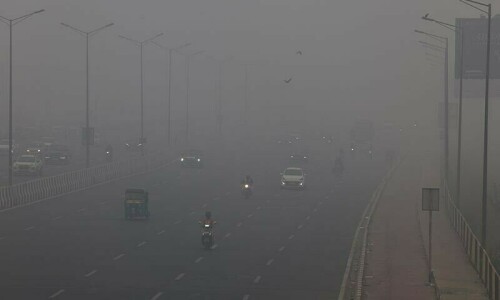Maya escapes the Deccan, the memory of her dead husband, society’s expectations of a widow, and her disowning family, moves to Ranikhet to teach at a Catholic mission and is immediately immersed in its simplicity and quiet grandeur at the base of the Himalayas. The estate she lives on — named The Light House — is owned by Diwan Sahib, a relic of an earlier time, once the Diwan of the Nawab of Surajgarh. He is Maya’s friend and confidant, regaling her in the afternoons of his once-important political position, extravagant lifestyle and bevy of women. She in turn listens as well as helps him write his magnum opus: a biography of James Corbett, the hunter, adventurer and Diwan Sahib’s hero. Punctuated in between are visits made to The Light House by academics, historians and researchers looking for the letters Edwina Mountbatten and Jawaharlal Nehru wrote each other, rumoured to be in Diwan Sahib’s possession. Whether the correspondences truly exist or not is left tantalisingly to the reader’s imagination. What is beyond question, though, is Diwan Sahib’s smug acknowledgment of the appreciation he receives as a result.
The insight into the human psyche The Folded Earth by Anuradha Roy presents is true to life, honest. Maya’s neighbour on the estate is a fiery matriarch aptly nicknamed Ama, who lives with her granddaughter, the shy yet equally feisty Charu and her son Puran, the local animal whisperer who does not “seem to have all his wits about him”. As Maya settles into this new life, it takes a turn when a mysterious, mountaineering young relative of Diwan Sahib’s, Veer, comes to live at the estate to establish a trekking company. Despite her reluctance, Maya feels intrigued and excited by him and a tryst develops. The mourning widow’s forays into guilt and mental clamour are explored admirably here. While she yearns for tenderness, the voice of her husband taunts her about having forgotten his memory and a recurring nightmare compounds this guilt. This examination of the subconscious is effective, making Maya’s guilt tangible, driving our curiosity and pulling us into the narrative. Her anguish and contradictory emotions are further amplified by the fact that she is clueless about how her husband Michael — a press photographer with a passion for mountaineering — was killed during a trek to an icy mountainous lake. All she knows are little forensic details. The closure she yearns for is terrifying to confront yet burns a hole in her like none other.
Meanwhile, Charu finds love and the comparison between her budding, nubile romance and the jilted, disillusioned and unpredictable chemistry Maya shares with Veer is dealt with poignantly, sensitively. Both are charged and rousing but the expectations, consequences and desires stand poles apart. In the background, Ranikhet turns into an arena for politics.
Various parties vie for control and the incumbent administrator’s over-efficiency in transforming the little town “into the Switzerland of Asia” underscores the changing of the guard.
The old, like its relics, quirks and personnel, is weeded to make way for the new. What Maya ran away from comes back to haunt her and she’s brought to a point where she must face her demons or flee again. The novel’s denouement is satisfying and brief yet taut and human.
The novel examines loss, yearning, seemingly inconsequential actions, culpability, rationale and the frailty of human existence, from a refreshingly simple perspective. As we are introduced to Maya’s microcosm — Diwan Sahib, Charu, Ama, others — there is familiarity and recognition as all of these people exist in our lives as well. They are our friends, confidants, relatives, acquaintances and help. The dynamic the writer weaves between these all-too-real characters is instantly identifiable and at times frighteningly real. Their feuding, musings, conversations and misgivings are captured maturely and without judgement. The escape Maya chooses has hurtful echoes of her once-blissful plains existence.
Despite being removed from the city, the sparsely populated town has a sprawl of its own; the breeze brings with it murmurs of what the hills hide and threatens madness. Including Maya, the characters are treated generously, albeit a little typically. Diwan Sahib, a relic of colonial days, symbolically and physically decaying in his British-era mansion, is stoic and acidic, yet giving and charming. Charu, as the stereotypical subcontinent village girl, is given a fairytale-like strength and presence of mind. Her grandmother Ama, accurate as a fierce, gossiping, world-wise and world-weary matriarch with an unmistakable heart of gold, gives the reader a herald, the announcer, steeped in as much history as the mountains around her. Maya’s husband, introduced in flashbacks, is a patient, sacrificing, affectionate man whose loss proves soul-crushing.
Then there are minor characters that round up Maya’s new world. The General, who is a disciplinarian and military zealot; Miss Wilson, Maya’s boss at school, who is over-committed to Christ and her institution; and Puran’s ubiquitous wild animal rescue missions and total ineptitude with humans is a study in the primal. The land is also personified — the plains of the Deccan are domineering, steamy, and unfolded; the ‘folded’ realm of Ranikhet deceptive, whimsical yet decisive. Largely, the characterisation is fair, non-judgemental and has shades of grey instead of being black and white. However, having portrayed her characters so, the writer perhaps overcompensates. All of them, while human, retain reserves of an x-factor and this romanticising extends to their circumstances as well: Diwan Sahib’s Ms Havisham-esque tragic air; Veer’s pre-meditated mysteriousness; Ama’s street-wisdom; and Charu’s ability to overcome adversity. What should have served to add dimension backfires somewhat.
Despite this, what makes The Folded Earth a readable and enjoyable work is the unpretentious and simple use of language. Banished, thankfully, are misplaced adjectives, unnecessary explanations of colloquialisms and bracketed justifications of how and why Hindi or Tamil words are spoken by the characters. This last quality is especially praiseworthy, particularly to readers with a South Asian sensibility, without taking away from the novel’s accessibility. The plot is engaging, gripping and believable, highlighting universal, yet non-cliched themes. As a whole, what the book delivers is thoughtful entertainment.
The Folded Earth (NOVEL) By Anuradha Roy Hachette, India ISBN 978-0857050435 256pp. Rs995















































Dear visitor, the comments section is undergoing an overhaul and will return soon.